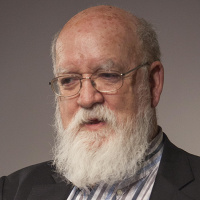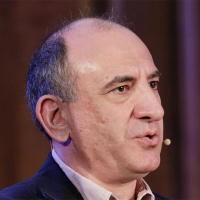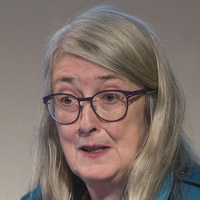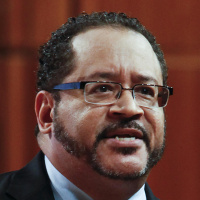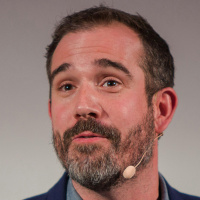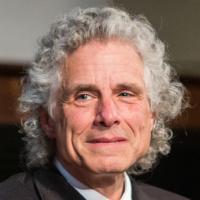Intelligence Squared
- Author: Vários
- Narrator: Vários
- Publisher: Podcast
- Duration: 1111:08:54
- More information
Informações:
Synopsis
Intelligence Squared is the worlds leading forum for debate and intelligent discussion. Live and online we take you to the heart of the issues that matter, in the company of some of the worlds sharpest minds and most exciting orators. Join the debate at www.intelligencesquared.com and download our weekly podcast every Friday.
Episodes
-
Daniel Dennett on Tools To Transform Our Thinking
22/06/2017 Duration: 01h04minDaniel Dennett is one of the world's most original and provocative thinkers. A philosopher and cognitive scientist, he is known as one of the 'Four Horseman of New Atheism' along with Richard Dawkins, Sam Harris and the late Christopher Hitchens. In 2013 he came to Intelligence Squared to share the insights he has acquired over his 40-year career into the nature of how we think, decide and act. Dennett revealed his favourite thinking tools, or 'intuition pumps', that he and others have developed for addressing life's most fundamental questions. As well as taking a fresh look at familiar moves - Occam's Razor, reductio ad absurdum - he discussed new cognitive solutions designed for the most treacherous subject matter: evolution, meaning, consciousness and free will. — We’d love to hear your feedback and what you think we should talk about next, who we should have on and what our future debates should be. Send us an email or voice note with your thoughts to podcasts@intelligencesquared.com or Tweet us @intelli
-
It's time to bring Russia in from the cold: Rapprochement is in the West's best interests
15/06/2017 Duration: 01h04minIs it in the West’s interests to bring Russia in from the cold? Or should we be on our guard against an ascendant, belligerent country on Europe’s borders? For this major debate, Intelligence Squared put together a stellar line-up. Making the case for rapprochement with Russia was Vladimir Pozner, one of Russia’s best known television journalists and a former advocate for the Soviet Union, and Domitilla Sagramoso, a leading expert on security in Russia; arguing against them were Michael Hayden, former director of both the CIA and the NSA, and Radek Sikorski, who was Poland’s foreign minister from 2007 to 2014. Support this show http://supporter.acast.com/intelligencesquared. See acast.com/privacy for privacy and opt-out information. Learn more about your ad choices. Visit podcastchoices.com/adchoices
-
Europe on the Edge
08/06/2017 Duration: 01h05minWhat’s happening to Europe? The fall of the Berlin Wall in 1989 was seen as a triumph for liberal democracy. True, the ‘end of history’ narrative didn’t play out across the world as many predicted. But in Europe political liberalism seemed unshakable, supported as it was by international business and transnational organisations such as the EU and NATO. But now Europe stands at a precarious moment. Anti-establishment and anti-EU political parties are on the rise. Brexit and the presidency of Donald Trump add to the uncertainty. Europe seems to face a near near-constant threat of terrorist attacks. And while Marine Le Pen didn’t sweep to victory in the recent French presidential election, the new president Emmanuel Macron faces an uphill battle to fix the French economy and reform the EU’s institutions. If he fails, Le Pen could be well set to win the presidency in 2022. How can we account for this surge of support for far-right and populist parties in Europe? Conventional wisdom has it that it is only in times
-
Can innovation transform London into a carbon neutral city?
01/06/2017 Duration: 56minCould London be the first carbon neutral city? Listen to this exciting debate hosted by Intelligence Squared. Gadget guru Jason Bradbury is the chair, plus guests including award winning actor and broadcaster Richard Ayoade. Support this show http://supporter.acast.com/intelligencesquared. See acast.com/privacy for privacy and opt-out information. Learn more about your ad choices. Visit podcastchoices.com/adchoices
-
Fake News: The Facts
25/05/2017 Duration: 01h06minThere are lies, damn lies, and then there’s fake news. Manipulating the facts for political gain is as old as politics itself, but due to the rise of social media and search engine algorithms false stories can now spread like wildfire. In the run-up to the US presidential election, more people on Facebook engaged with fake news than they did with fact-checked media outlets. And according to a study by Stanford University, fabricated news items favouring Donald Trump were shared 30 million times during the campaign. In the recent French elections, a quarter of the political stories shared on Twitter were based on deliberate misinformation. Fake news was even broadcast live on television during the second-round debate, when Marine Le Pen alluded to a false online story that her rival Emmanuel Macron had an offshore bank account in the Bahamas. Welcome to the world of ‘alternative facts’, where conspiracy theories, false claims and dodgy statistics proliferate. This phenomenon doesn’t just undermine the work of
-
How to Think Like a Freak: Learn How to Make Smarter Decisions with the authors of "Freakonomics"
18/05/2017 Duration: 01h04minThe books 'Freakonomics' and 'SuperFreakonomics' have been worldwide sensations, selling tens of millions of copies. They have come to stand for challenging conventional wisdom using data rather than emotion. Questions they examine are typically: Which is more dangerous, a gun or a swimming pool? How much do parents really matter? Why is chemotherapy prescribed so often if it’s so ineffective? Now the books’ two authors, Steven D. Levitt and Stephen J. Dubner, have turned what they’ve learned into a readable and practical toolkit for thinking smarter, harder, and different – thinking, that is, like a Freak. On 28th May they came to Intelligence Squared to discuss their new Frequel, 'Think Like a Freak'. By analysing the plans we form and the morals we choose, they showed how their insights can be applied to help us make smarter decisions in our daily lives. Support this show http://supporter.acast.com/intelligencesquared. See acast.com/privacy for privacy and opt-out information. Learn more about your ad cho
-
Between You and I The English Language Is Going To The Dogs
11/05/2017 Duration: 01h01minSpeaking and writing correct English are the hallmarks of an intelligent person. No one who cares about language wants to be caught splitting an infinitive or muddling up ‘infer’ and ‘imply’. Which is why the bestseller lists are regularly topped by books on 'good' English by the likes of Daily Mail polemicist Simon Heffer and Today programme presenter John Humphrys - both of whom defend the motion in this debate. Taking them on are Mary Beard, Professor of Classics at Cambridge, and Oliver Kamm, top commentator at The Times. No one would dare describe either as lacking in grey matter or being insensitive to good English. So why the disagreement with Heffer and Humphrys? Because people on their side of the argument believe that our language can take care of itself, and that it certainly doesn’t need a bunch of self-appointed rule-book sticklers to make others feel insecure about how they speak and write. Good style matters, they argue, and can be taught but the pedants should stop confusing their pet peeves
-
An Evening with Slavoj Žižek
04/05/2017 Duration: 01h05minRadical philosopher, polymath, film star, cult icon, and author of over 30 books, Slavoj Žižek is one of the most controversial and leading contemporary public intellectuals, simultaneously acclaimed as the ‘Elvis of cultural theory’ and denounced as ‘the most dangerous philosopher in the West’. In this special lecture for Intelligence Squared from July 2011, Žižek argues that global capitalism is fast approaching its terminal crisis and that our collective responses to economic Armageddon correspond to the five stages of grief – ideological denial, explosions of anger, attempts at bargaining, followed by depression and finally acceptance of change. Referencing everything from Kafka, the "Hollywood Marxism" of Avatar, the Arab Spring and WikiLeaks, he presents a roadmap for finding a way beyond the madness. Support this show http://supporter.acast.com/intelligencesquared. See acast.com/privacy for privacy and opt-out information. Learn more about your ad choices. Visit podcastchoices.com/adchoices
-
Trump is Making America Great Again
27/04/2017 Duration: 01h05minAs Donald Trump approaches the first 100 days of his presidency, things couldn’t be worse. His administration has been more gaffe-prone, incompetent and unstable than any other in American history. Trump has been engulfed in a scandal over his campaign’s links to Russia, his first choice for National Security Advisor, Michael Flynn, was forced to resign within weeks, and other senior officials remain under investigation for dodgy dealings with the Kremlin. And what of Trump’s key policies? Despite a Republican majority, his efforts to repeal Obamacare foundered in Congress, while his controversial ‘travel ban’ was deemed unconstitutional and blocked twice in the courts. Meanwhile, Trump has kept busy bragging about the size of his inauguration crowd and tweeting crackpot wiretapping allegations. And when it comes to foreign policy, he has been just as reckless and haphazard as his critics predicted. He has flip-flopped on NATO and has taken a bizarrely belligerent stance against longstanding allies such as Ge
-
Anne-Marie Slaughter on Our Hyper-Networked World
20/04/2017 Duration: 01h05minAnne-Marie Slaughter is one of the world’s top foreign policy thinkers, admired by influential global leaders such as Joe Biden, Condoleeza Rice and Eric Schmidt. A former senior adviser to Hillary Clinton in the State Department, she hit the headlines in 2012 when she published an article in The Atlantic called ‘Why Women Still Can’t Have It All’. The piece went viral and sparked off a massive debate about the future of work-life balance. But long before this, Slaughter was hailed in political circles for her understanding of the emerging world of networks. She was among the first to see how networks are overturning traditional hierarchies, upending international diplomacy and transforming patterns of global power and politics. Now once again, with the launch of her new book 'The Chessboard and the Web', she has moved ahead of conventional thinking and came to the Intelligence Squared stage to share her insights. The power of networks, she explained, has grown so quickly with the advance of digital technolog
-
Has the Political Establishment Failed America?
13/04/2017 Duration: 01h05minHas the political establishment failed America? Whether they voted for Trump or Sanders or none of the above, millions of Americans say the answer is yes – and that the system benefits the elites at the expense of everyone else. Others say that despite its flaws, the political establishment has been a force for unparalleled stability, prosperity and equality — and that it is now the only thing standing between America and the abyss. Is it time for the old guard to come to the rescue or to make way for a new political reality? Arguing in favour of the motion were Michael Eric Dyson of Georgetown University and William Howell of UChicago. Arguing against the motion were Jennifer Rubin of the Washington Post and Eric Oliver of UChicago. Support this show http://supporter.acast.com/intelligencesquared. See acast.com/privacy for privacy and opt-out information. Learn more about your ad choices. Visit podcastchoices.com/adchoices
-
Whose Prosperity? How Can We Build Inclusive and Sustainable Economies?
06/04/2017 Duration: 01h06minA debate on the eve of the Second PAGE Ministerial Conference (http://bit.ly/2jhYyaX). Filmed at the Federal Ministry for the Environment, Nature Conservation, Building and Nuclear Safety (BMUB) in Berlin on March 26th 2017. Globalisation has created wealth across the world, lifting hundreds of millions out of extreme poverty. But has too much of the wealth ended up in the hands of too few? How can our model for globalisation be reconfigured to promote more equal, stable economies which do not overstretch environmental resources? Our current socio-economic system, many argue, is increasing inequalities and accelerating climate change and destruction of the environment. The Sustainable Development Goals — the UN’s roadmap to prosperity for all on a healthy planet — will require considerable financial resources. Many experts are now calling for a change to our entire model of doing business, by measuring national prosperity beyond GDP, sharing wealth equitably, and shifting economies to an inclusive, sustainabl
-
Social Media is Killing Art
30/03/2017 Duration: 01h04minSocial media is like fast food – rapidly consumed for instant gratification. No wonder social media demeans art. Artworks that instantly seduce online become tedious when contemplated over time in the flesh. Once art goes viral, it gains traction, particularly in the market, and becomes unjustifiably acclaimed. Museums may be keen to reach new audiences, but can great masterpieces really be appreciated on the miniature canvas of your mobile phone screen? Shrink art and you shrink its power – no one can really believe they've experienced an artwork without examining the ideas and the artist's mastery of their medium. And this is an even bigger issue when it comes to experiential artworks such as performance or virtual reality. What nostalgic nonsense, say digital art fans. Attacking social media is like attacking photography in the 19th century. The internet is the medium of the age. To ignore it is to reject the future. For existing masterpieces, social media is the key to all the world’s museums and gallerie
-
Niall Ferguson On The Six Killer Apps Of Western Civilisation
24/03/2017 Duration: 01h03minNiall Ferguson is the most brilliant British historian of his generation. In this talk from February 2011, based on his book 'Civilisation: The West and the Rest', he asks how Western civilization came to dominate the rest of the world. His answer is that the West developed six “killer applications” that the Rest lacked: competition, science, democracy, medicine, consumerism and the Protestant work ethic. The key question today is whether or not the West has lost its monopoly on these six things. If it has and the Rest of the world can successfully download these apps, we may be living through the end of Western ascendancy. Support this show http://supporter.acast.com/intelligencesquared. See acast.com/privacy for privacy and opt-out information. Learn more about your ad choices. Visit podcastchoices.com/adchoices
-
Don’t give them what they want: Terrorists should be starved of the oxygen of publicity
17/03/2017 Duration: 01h05minWhy do they do it? Again and again, after every attack, our media react by giving the terrorists exactly what they want – maximum publicity. Of course, the public should be told that an atrocity has taken place. But each attack dominates the news for days at a stretch. The TV networks go into overdrive, flying out their journalists to the scene of the attack and saturating their airtime. All this plays into the hands of terrorist organisations, allowing their killers to be glorified in the eyes of their supporters. In addition, the wall-to-wall news coverage creates a climate of fear and fuels the more authoritarian and xenophobic strands of our politics. President Trump’s recent actions – banning refugees and appearing to reference fictional terrorist attacks in Sweden – might be seen as an inevitable consequence of this hysteria. We should get things into proportion. After all, you’re more likely to fatally slip in the shower than be killed in a terrorist attack. This is the line that was taken by former Ti
-
Feminism Is For Everyone
10/03/2017 Duration: 01h04minA year ago, you could have been forgiven for thinking that gender equality was on an unstoppable trajectory. America stood poised to elect its first female president. On this side of the Atlantic, members of the political and cultural establishment proudly sported ‘This Is What a Feminist Looks Like’ T-shirts. Had you told a Hillary Clinton supporter or one of those T-shirt campaigners that a year later the US president would be Donald Trump, a man with an abysmal record of sexually harassing women, and that women over the world would be defending their basic rights, including access to abortion, they would have barely believed it. How did we end up here? Has feminism become trapped, as some claim, in its own elitist ‘lean-in’ bubble? The recent Women’s Marches may have seen millions take to the streets in a tide of popular outrage. But some feminist commentators argue that the marches only demonstrated just how much middle-class liberal aspirations have become over-represented in the gender equality movement
-
Jeffrey Sachs on America and a New World Order
03/03/2017 Duration: 01h05min'America first!' Donald Trump hammered out this message over and again in his inauguration speech a week ago today. He promised tariffs, a crackdown on immigration, and a restoration of American military might. He entered the White House as the least popular incoming president in 40 years. Not every liberal thinker, however, is in a state of despair. Jeffrey Sachs was recently ranked by The Economist as one of the world’s most influential political scientists. No Trump supporter himself, he came to the Intelligence Squared stage to explain why there may be silver linings to the Trump cloud, and to set out a new world order. Take trade. Trump has threatened to tear up Nafta and slam huge taxes on Mexican imports, and has already withdrawn the US from the Trans-Pacific Partnership to bring jobs back to the heartlands of America. While this strikes fear amongst free-trade supporters, there is a case to be made that globalisation has been moving faster than is politically sustainable, dividing rich from poor. Or
-
Daniel Dennett on the Evolution of the Mind, Consciousness and AI
24/02/2017 Duration: 01h05minHow come there are conscious minds? How do language and culture evolve? Should we still teach children things which computers can do better? Will our smart electronic devices rob us of our intelligence? Will human intelligence and AI co-evolve? These are some of the intriguing questions that Daniel Dennett, one of the most influential and provocative thinkers of modern times, sought to answer when he came to the Intelligence Squared stage to discuss his lifetime’s work on the evolution of the human mind. Dennett’s cross-disciplinary approach – encompassing neuroscience, evolutionary biology and artificial intelligence – has been widely acclaimed and helped redefine the role of the philosopher for our age. In this exclusive event, Dennett explored the major themes of his forthcoming book, 'From Bacteria to Bach and Back', including how our minds came into existence, how our brains work, and how ideas are culturally transmitted. He explorede many of the notions we take for granted about how we think – such as t
-
The Bittersweet Truth About What We Eat
17/02/2017 Duration: 01h05minWhat should we be eating to live a long and healthy life? How is it that some people can eat absolutely anything and stay slim, while others on a ‘healthy’ diet get fat? Why is it that Cubans are much healthier than Americans, despite eating on average twice the amount of sugar? To unpack the truth behind the often confusing information about the food we eat, Intelligence Squared brought together some of the world’s leading experts on the science of human nutrition and health. Sugar has recently replaced saturated fat as the nutritional enemy number one. The theory is that it messes with our metabolism and causes heart disease, obesity and diabetes. Arguing that sugar is the tobacco of the new millennium in our event was acclaimed science writer Gary Taubes, whose new book The Case Against Sugar has been making waves on both sides of the Atlantic. No one doubts that consuming a lot of sugar is unhealthy, but does the ‘sugar is poison’ theory really tell the whole story? A different explanation lies in a subje
-
Steven Pinker on Good Writing, with Ian McEwan
10/02/2017 Duration: 01h01minSteven Pinker is one of the world’s leading authorities on language, mind and human nature. A professor of psychology at Harvard, he is the bestselling author of eight books and regularly appears in lists of the world’s top 100 thinkers. In 2014 he returned to the Intelligence Squared stage to discuss his latest publication 'The Sense of Style', a short and entertaining writing guide for the 21st century. Pinker argued that bad writing can’t be blamed on the internet, or on “the kids today”. Good writing has always been hard: a performance requiring pretence, empathy, and a drive for coherence. He answered questions such as: how can we overcome the “curse of knowledge”, the difficulty in imagining what it’s like not to know something we do? And how can we distinguish the myths and superstitions about language from helpful rules that enhance clarity and grace? Pinker showed how everyone can improve their mastery of writing and their appreciation of the art. Professor Pinker was in conversation with Ian McEwan,

